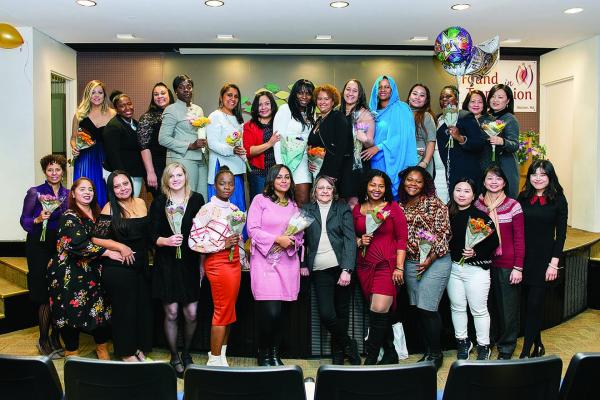June 24, 2021

Found in Translation trains immigrant women to provide translation services in the medical sector. Above, the program’s graduates are shown during a 2019 ceremony. The organization presently has a network of 291 graduates. Image courtesy Found in Translation
Found in Translation, a Dorchester-based nonprofit, has received a $400,000 grant from the Cummings Foundation, to be spread over 10 years, that will allow it to continue training low-income, bilingual women to become medical interpreters.
The organization, which will be ten years old in September, was founded to boost the number of immigrant women providing translation services in the medical sector. The new grant will provide a decade of consistent funds to assist in that effort.
“It takes a little of the weight off and allows us to really focus on pandemic resilience and on our community’s needs,” said Abigail Setterholm, Impact director at the nonprofit, which has about 10 employees. “Our women have wonderful language skills but high economic need. Our job is to make sure there’s no limit on their goals and ambitions.”
A network of program graduates, donors, and similarly aligned organizations is the organization’s “special sauce,” according to Setterholm. The network includes tech-literacy nonprofit Tech Goes Home, which provided technical assistance to Found in Translation trainees as the pandemic forced many to go into remote learning mode.
“Community building is always better in person: Some students start carpooling and their kids become friends, they share snacks, and some students will complete the teacher training track and come back to the program as teachers,” she said.
Juliana Cardosa-Barrio, a Chelsea mother who graduated from Found in Translation in 2019, said the 140-hour interpretation training program “transformed my life” after a distressing and illuminating year accompanying her father’s cancer treatment.
Cardosa-Barrio had mediated pediatric appointments and parent-teacher conferences throughout her childhood, but the barrage of praise her informal interpretation received from her father’s chemotherapy nurses and radiographers during his cancer treatment left her flabbergasted. In previous professional and educational endeavors, she’d felt unsupported.
The daughter of undocumented Columbian immigrants, Cardosa-Barrio had no loan access, making college an aspirational but ultimately inviable prospect. After one semester at North Shore Community College, she dropped out.
“I grew up in the 1980s when there were a lot of Latino immigrants arriving, and I don’t think the US knew what to do with all of us. The profession, interpretation, was really young and there weren’t very many resources or very many chances for people like me,” she said.
By the time she’d received her work permit and Social Security through the Deferred Action for Childhood Arrivals (DACA) federal program, she was a mother of eight children and had little time to give serious thought to enrolling in a college translation and interpretation program.
Her experience during her father’s illness, and a discarded flyer she found in a trash bin that promoted a medical interpretation training program, spurred her decision to sign up.
Nearly two years after graduating from the program, Cardosa-Barrio says the grueling hours of rote memorization and conversational practice were all worth it. Her independent contract with the Woburn-based interpretation agency Cross Cultural Communication Systems keeps her schedule full, and she’s currently training to receive her national certification.
“With my father’s illness, I became his caregiver, and that exposed me to the lack of language accessibility that exists in medicine,” said Cardosa-Barrio. “It shouldn’t exist; everyone deserves medical care.
“I want to be a good role model for my children. I want them to know my story and have respect for people who may not speak English, whatever the reason may be,” she added.
Language accessibility, Setterholm said, is a metric of institutions’ respect for non-English speakers and is sparse even in diverse states like Massachusetts. State officials are using used Google Translate, an “imperfect” translation software with several blind spots, including many Creole dialects, in the vaccine deployment.
The interpreting field is also besieged with accessibility barriers – wages are stagnating and the demanding hours mean “just having the certification in hand is no longer enough,” said Setterholm.
“Interpretation requires consistent learning and the field is everchanging,” she noted. “Technology, which was an asset in the past, is a necessity now,” she added. “Interpreters are often misclassified as gig workers, and the pandemic has really highlighted that this is a persistent issue. This is a high-skill profession and it should be paid as such.”
Carolina Lee, a Vietnamese interpreter and Found in Translation alumna, said the job comes with an onerous set of responsibilities and taxing demands. At one point, Lee freelanced with eight different translation agencies and often worked 15-hour days. Still, she said, her only regret is “not knowing about or having met Found in Translation earlier in life.”
Strengthened by its newly awarded grant, the second it has received from the Cummings Foundation since 2015, Found in Translation sees its support services continuing to expand to sustain its former students’ efforts to further their studies and their entrepreneurships. The organization has a robust network of 291 graduates, and at least one of them, Lee, dreams of founding her own interpretation agency.
“It’s a very demanding job,” said Lee, “but I love every moment.”




